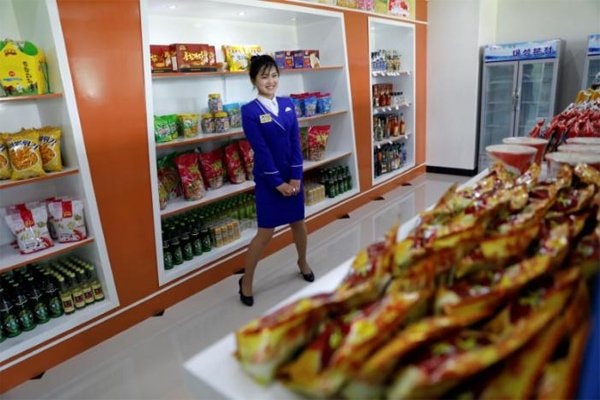How has Kim Jong Un dramatically changed North Korea?
From carrot-flavored toothpaste and activated charcoal masks to motorbikes and solar panels, North Korean homegrown goods are increasingly taking up space in the country's shops and supermarkets, replacing most imports from China.
The Trump administration is now considering tightening sanctions on North Korea to pressure the Kim Jong Un regime to dismantle its nuclear and missile programs. However, according to recent visitors to North Korea, Pyongyang is pursuing a dual policy: developing both its military and economy.
 |
| North Korea boosts production and consumption of domestic goods. Photo: Reuters |
Most consumer products in North Korea are imported from China. However, under the leadership of Kim Jong Un, the country has made efforts to produce and sell domestic goods to avoid losing cash flow and to increase the sense of self-reliance.
According to Reuters, there is currently no accurate data on the proportion of domestically produced goods circulating in North Korea. Import figures from countries such as China and Malaysia are also difficult to accurately reflect.
China’s Ministry of Commerce declined to comment when asked whether its declining exports to North Korea were due to North Korea’s push to produce its own goods. However, visitors to North Korea describe how major North Korean companies such as Air Koryo, which operates the national airline, and the Naegohyang Group have been diversifying into consumer goods such as sportswear and cigarettes.
A Reuters team visiting Pyongyang in April found shelves stocked with drinks, biscuits and other staples made in the country. Other visitors saw canned food, coffee, toothpaste, soap, bicycles and other locally produced goods on sale across the city.
“As many new factories opened, labeling, packaging and listing of product ingredients have improved,” said a vendor named Rhee Kyong-sook, 33.
"I can feel the real fruit taste in the drinks produced in North Korea compared to drinks from other countries," said Kim Chul-ung, a 39-year-old teacher at the store.
Visitors to North Korea say that North Korean products are becoming more sophisticated and diverse, with a wide variety of types and grades. Vendors are also becoming more competitive, often offering food samples to customers, a stark contrast to the sales habits of five years ago.
"Around 2013, Kim Jong Un started talking about the need for import substitution," said Andray Abrahamian of the Singapore-based Choson Exchange, which trains North Koreans in business skills. "There was a very clear recognition that too many goods were being imported from China, not just high-quality consumer goods but also things like food."
Merchants and retailers admit that the North Korean market is very attractive right now.
"North Koreans are increasingly reluctant to use Chinese products because they find them of poor quality," said a businessman who specializes in exporting consumer goods to North Korea. In addition, there have been many food safety scandals in China in recent years, including contaminated rice and milk powder, which have also made North Koreans wary.
"Mothers in North Korea are like mothers in China, Canada or other countries, they want to feed their children the best food possible. I saw customers in a store comparing Chinese and North Korean products and then choosing the local product," said Michael Spavor of Paektu Exchange, an organization that specializes in bringing investors and tourists to North Korea.
However, North Korea remains heavily dependent on trade with China, and most of its raw materials for manufacturing and consumer goods are still imported from China.
According to Vietnamnet.vn
| RELATED NEWS |
|---|

